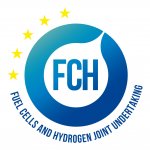How can pupils in elementary school grasp the concept of energy? What are means to engage them and how to use scientific terms? These were some of the questions raised and discussed at the national training workshops for teachers using the FCHgo toolkit. The main objective of the training sessions was to introduce teachers to the materials of the toolkit and to the corresponding lesson plans. The individual materials are part of a comprehensive educational path that guides pupils from understanding fundamental energy principles to learning, for example, about the application of hydrogen energy in a fuel cell electric car. In total, 82 teachers from 48 schools participated to 16 workshops in Denmark, Germany, Italy, Poland and Switzerland.
Metaphor vs. formal language – Why the FCHgo materials are different from most schoolbooks
FCHgo uses language that differs from the one that can be found in usual chemistry or physics books. The teaching materials of FCHgo provide names for natural phenomena that are close to children’s everyday experience. Teachers at the workshops acknowledged the simple language and the imaginative representations of energy carriers in the FCHgo toolkit as helpful to stimulate pupils’ understanding. However, in some cases, teachers debated if the use of imaginative language would confuse students if they had to use formal scientific terms later in their education. On this topic, Prof. Federico Corni, who co-authored the FCHgo concept, explains: “While making pupils familiar with scientific terms is important, of course, they are not essential to understanding the principles of energy. Actually, formal technical language can often scare off pupils and inhibit their interest in and understanding of the subject. FCHgo therefore works with pictures, metaphors, and stories to convey the actual character of energy, its nature, and how it lets us quantify the notion of power of forces of nature.”
It is not only about knowing facts, but about understanding principles
Another issue discussed at the German teacher training workshop in Munich, was how much children at elementary school level need to know about the technical details of fuel cells, e.g. on what a membrane looks like and how it works. Whereas the FCHgo materials for older pupils, notably the PowerPoint presentations developed by Polish partner UMK, cover these aspects in-depth, the materials for younger children pursue a different approach and focus on facilitating understanding of principles. “From something as simple as eating an apple, pupils can take away an idea of the power of substances. Every child understands that an apple with all its juiciness and sweetness or any other type of food provide energy to our bodies. How our bodies process the apple is not that far from what is happening in a fuel cell: Energy is fed into the cell with hydrogen, the energy drives an electric process, and electricity powers the wheels of a car, for example. The goal of the ‘Apple Story’—developed at Zurich University of Applied Sciences at Winterthur—is to highlight these analogies,” explains Prof. Hans Fuchs.
Also, the card game of the toolkit helps children to understand the analogies between different energy carriers and exchangers. With the playing cards, initially developed by the Italian project Ergolandia at the Free University of Bolzano, children can playfully explore and learn about energy transmission. Teachers present at the workshop did not only like the colorful design of the cards but were confident pupils would love to play with them. One of the cards represents, of course, the energy carrier hydrogen.



